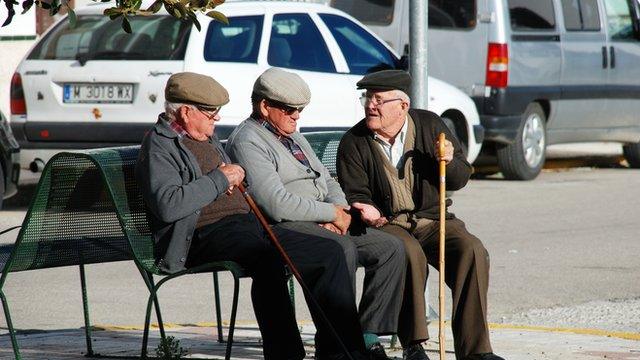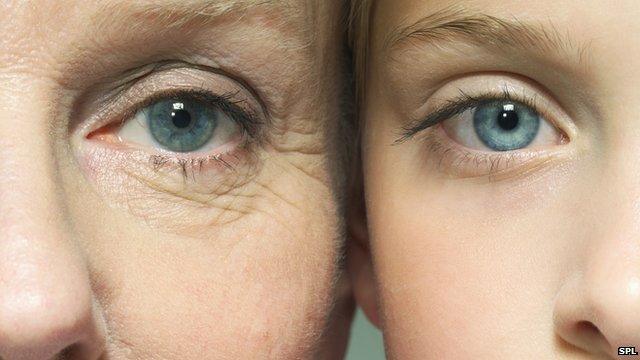Gender gap: Will men ever live as long as women?
- Published

It has long been accepted that women outlive men.
But new research from Imperial College London suggests the gender gap between men and women's life expectancies is narrowing.
It predicts in 2030 men in England and Wales can expect to live on average to 85.7 years - just two years fewer than women.
In 1981 on the other hand, men were likely to die six years before women on average.
But why does this gender gap exist and will it ever close?

Has there always been a gap?
In 1909 women tended to outlive men by just 2.5 years, Prof Les Mayhew at Cass Business School says.
At this point infections were the most common cause of death and they affected men and women equally in many respects.
But most adults were dead by their early fifties - and many lives would have ended much earlier through childhood illness.
As living standards improved and antibiotics were developed to help fight off major killers, life expectancy increased.
But despite these gains, the gap between men and women began to widen in the second half of the century.

Why does the gap exist?
Smoking is widely recognised as one of the main reasons behind the gender gap.
And quitting is seen by many as the main reason it is now narrowed.
Records show men took up tobacco earlier than women and more of them picked up the habit - meaning their epidemic had a greater and long-lasting impact on their life spans.
By 1948 estimates suggest 80% of men were using some form of tobacco.
Inevitably many died of smoking related ailments such as heart attacks and lung cancer.
And this stamped out many of the gains in life expectancy men may otherwise have enjoyed.

Women on the other hand took up smoking a generation later on average.
But the female habit never reached the same proportions that male smoking did.
By the 1960S and 1970s doctors and government officials had started to take the link between tobacco and death more seriously.
And gradually smoking rates began to decline.
Many of the benefits are being reaped today - and because more men smoked, they now enjoy a greater share in these longevity gains.
Prof Sir Richard Peto, from Oxford University says: "About half of all smokers are killed by tobacco if they continue to smoke.
"But stopping works amazingly well.
"Those who stop before the age of 40 - preferably well before then - avoid more than 90% of the risks."
Improvements in prevention and treatment of heart disease have contributed too.
And others suggest many men are involved in less dangerous jobs now.
For example, a million men were employed in dangerous mining in the 1920s putting them at risk of lung disease.

Do women have a biological advantage over men?

Prof Les Mayhew of Cass Business school argues this is unlikely.
In a study published last year he says: "It would be hard to justify these differences on biological grounds since the gender gap varies so much and is different in each country, and therefore it is more likely to be societal in origin."
But others say biological differences probably play a part.
Projections, external indicate when comparing non-smoking men and non-smoking women, life expectancy remains higher in women.
No one has pinned down exactly what this biological advantage would be, if it exists at all.
But experts suggest it could be partly due to hormones protecting women from heart disease.
Whatever is protecting women, their advantage over men has been hugely aggravated by smoking patterns, Prof Peto says.

What theories are there about female longevity?
Many theories on the male shortfall in life expectancy are still open to debate and yet to be proven definitively.
Some studies suggest females enjoy a longer life partly because their immune systems age more slowly.
So in older age they are able to fight off illnesses, while men grow more susceptible to disease.
Others argue there is an ancient, evolutionary answer to the gap - seen in other species too.
One theory, external suggests males' competitive natures- arising from a desire to attract mates - encourages them to engage in more risky and ultimately more fatal behaviours.
Others believe women may be needed for longer, to make sure their offspring are well cared for into the future.

Will it ever close?
Official figures show the gap has been closing gradually.
And Office of National Statistics estimates put the gap at around three years by 2037, external.
Prof Mayhew on the other hand, in work published in 2014, estimates men and women could expect to live as long as each other in 2030.
But others call that an implausible claim. Predictions are uncertain - many things could change in the years to come.
In the tricky world of modelling the future, there is some consensus on at least one thing. Both men and women are likely to continue living longer and according to some - healthier - lives for many years to come.
- Published30 April 2015

- Published10 April 2015